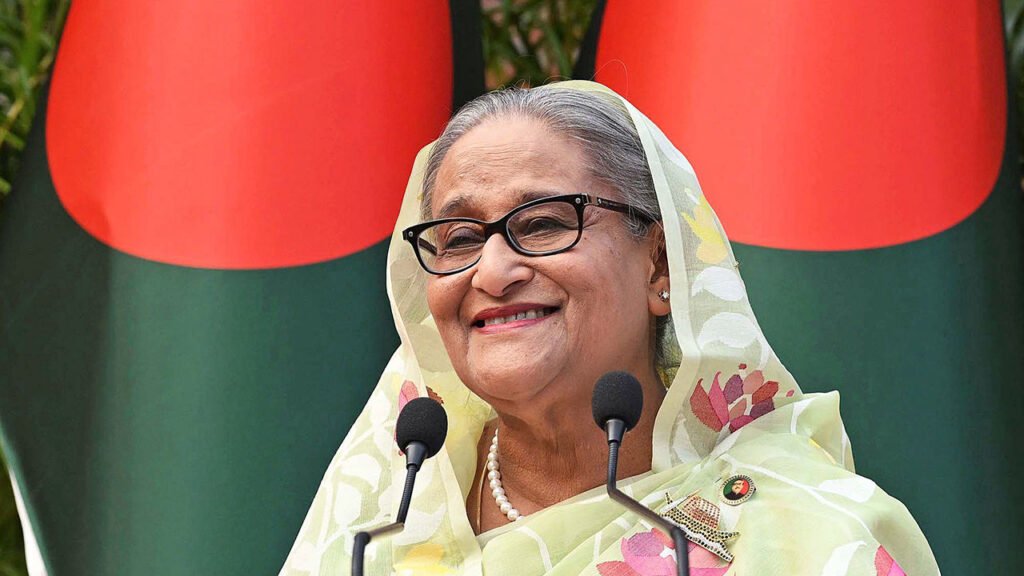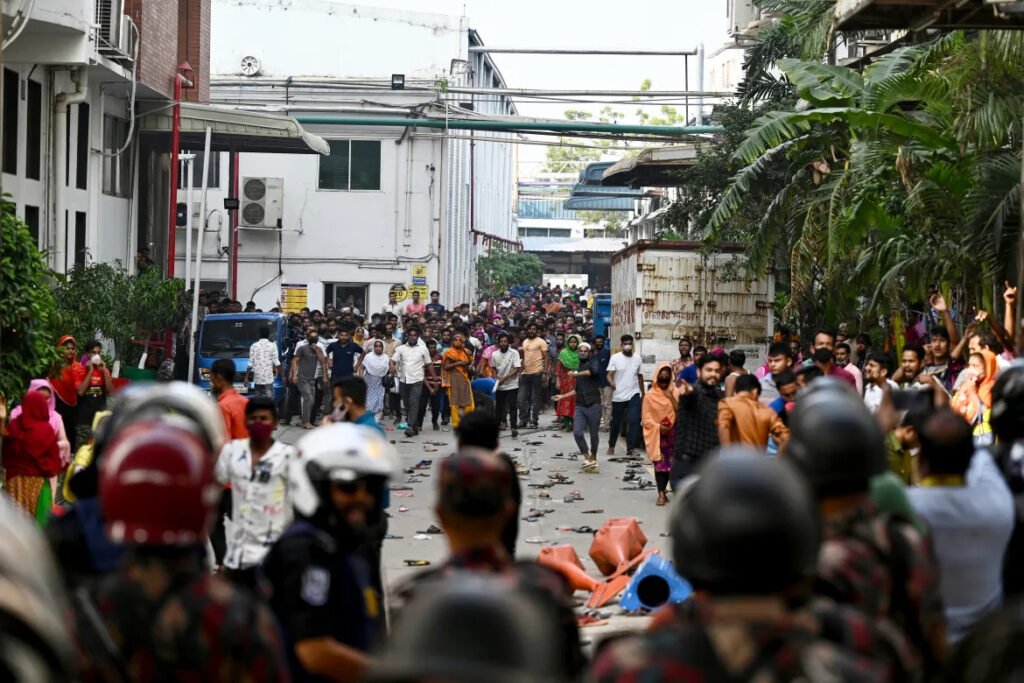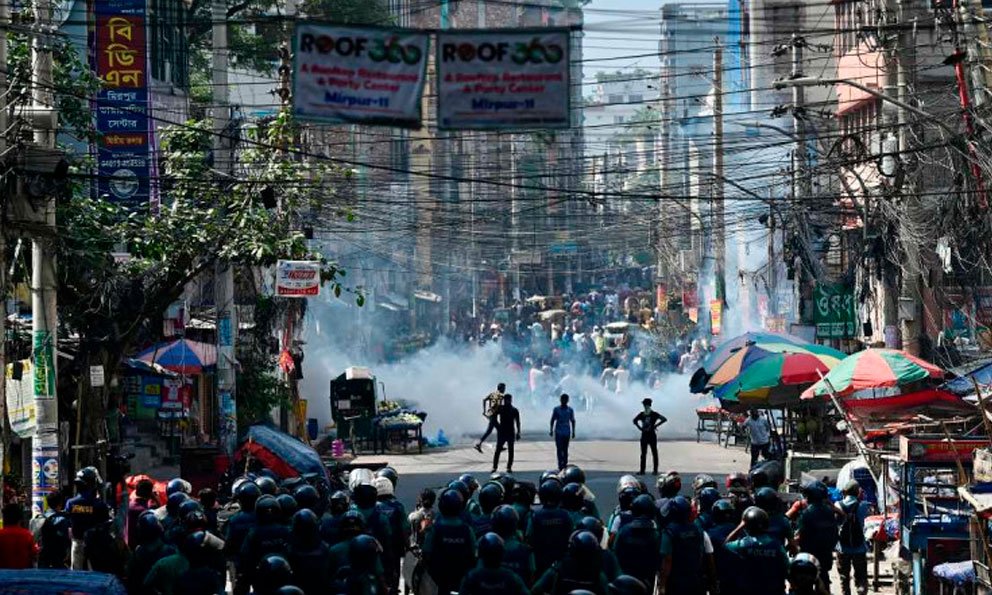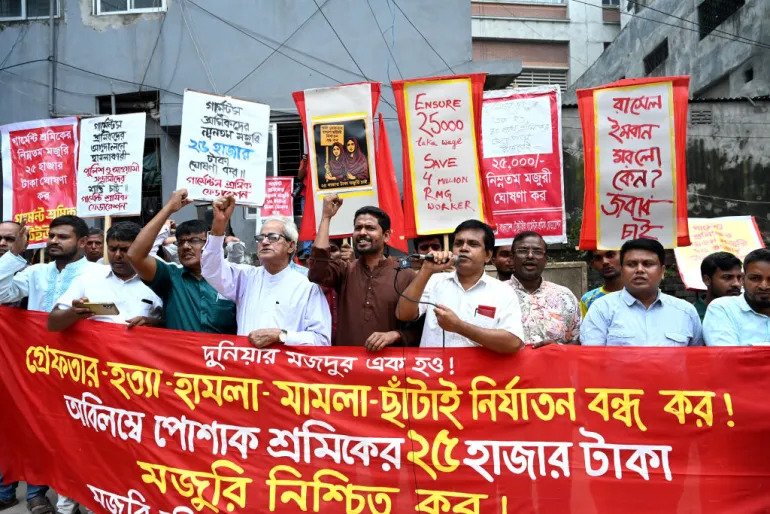Bangladesh: Workers Rise as Corruption and Economic Crisis Deepen
In November 2023, Bangladesh finds itself engulfed in a political and economic crisis, with mass protests, strikes, and violent confrontations shaking the nation. What began as a demand for better wages by garment workers has quickly escalated into a broader struggle against the corrupt government, rising inflation, and the exploitation of the working class by multinational corporations.
The garment sector, which forms the backbone of Bangladesh’s economy, has been the epicenter of this unrest. Over 500 factories have shut down as more than four million workers demand a wage increase from $75 to $209 per month. After weeks of protests and strikes, the government offered a meager 56% pay rise, setting the minimum wage at $113. This offer, which falls far short of the workers’ demands, has been rejected outright, with union leaders and workers stating that it is inadequate in the face of soaring inflation and a rising cost of living.
Economic Desperation Fuels Protests
Since coming to power in 2009, Sheikh Hasina’s Awami League (AL) government has overseen rapid economic growth, primarily driven by the garment industry. Bangladesh’s garment sector, the world’s second-largest after China, accounts for 85% of the country’s exports. Yet, this growth has come at a steep cost. Garment workers, most of whom are women, face brutal working conditions—long hours, low pay, and violent retaliation for missing productivity targets. Despite Bangladesh’s economic expansion, it remains one of the top ten nations with the most restrictive labor laws, making it an attractive hub for foreign companies eager to exploit cheap labor.
The COVID-19 pandemic and subsequent global economic downturn have devastated Bangladesh’s economy, leaving millions of people in poverty. With inflation at 9.6% and food inflation even higher at 13%, many workers are struggling to survive. As one striking worker put it, “We work to survive, but we can’t even cover our basic needs.”
Compounding the crisis is the government’s massive foreign debt. Since 2016, Bangladesh’s debt has doubled, and with rising global interest rates, paying it back has become increasingly difficult. Foreign reserves have plunged from $48 billion in 2021 to $20 billion in 2023, enough to cover only three months’ worth of imports.

Corruption and Repression
The Hasina government, though credited with a decade of economic growth, has been plagued by corruption and cronyism. Private firms with close ties to the ruling party, such as Summit Group, have received billions in state funds, while ordinary Bangladeshis continue to suffer. With elections scheduled for January 2024, the government has embarked on several “mega projects,” including an 11km elevated highway in Dhaka. However, these projects have done little to address the widespread poverty and hunger plaguing the country. One fruit vendor, expressing the frustration of many, said, “What do I do with these mega projects if I’m dying of starvation?”
The government’s response to growing dissent has been increasingly repressive. Opposition leaders from the Bangladesh National Party (BNP) have been arrested, and police have cracked down on demonstrations with violence. In late October, police fired on protesters, killing two people and sparking further unrest. The BNP, though historically associated with corruption and ties to right-wing Islamic fundamentalists, has been able to capitalize on public anger as a counterbalance to the Awami League.
The Power of the Garment Workers
Despite the government’s efforts to repress the protests, the power of Bangladesh’s garment workers cannot be understated. The garment sector employs over four million people, contributing approximately 16% of the country’s GDP. As the strikes have intensified, they have disrupted global supply chains, causing major international companies such as Primark, Zara, and H&M to urge the government to settle the dispute quickly.
The workers, however, are not easily placated. The government’s offer of a 56% wage increase has been rejected, with labor leaders calling for factories to open their books and prove they cannot afford to pay the workers. If the employers refuse, the unions are demanding the factories be expropriated and put under workers’ control.
This level of militancy has alarmed both the government and international corporations. But for the workers, this struggle is about more than just wages—it is about their dignity and their right to live without exploitation.


A Looming Revolutionary Crisis
As the January 2024 elections approach, Bangladesh stands on the precipice of a major political upheaval. The ruling class is divided, and the economic crisis is only worsening. If the Awami League manages to secure another term, either through vote rigging or a BNP boycott, the protests are likely to intensify. The working class, increasingly confident in its power, may soon turn its economic struggle into a political one, demanding not just better wages but an end to the corrupt regime itself.
The BNP, though an opportunistic and reactionary force, has been able to channel some of this anger for its own gain. But the people of Bangladesh are not fooled. There is growing cynicism towards all politicians, with many seeking a genuine alternative to the entrenched elites who have ruled the country since independence in 1971.
For Bangladesh’s working class, this represents a crucial moment. The garment workers, in particular, have the power to bring the entire economy to a halt. But to truly succeed, they must connect their immediate demands for better pay and conditions to a broader political struggle against the ruling class and the capitalist system that keeps them in poverty.
The Urgency of Revolutionary Leadership
Bangladesh’s current crisis underscores the urgent need for revolutionary leadership. The working class has shown its immense power in the strikes, but without a clear political direction, there is a danger that this energy will dissipate, leaving the country in the hands of the same corrupt elites who have profited from their suffering.
A revolutionary communist party that can unite the working class, channel its militancy, and offer a clear vision for a new society is more necessary than ever. The people of Bangladesh have had enough of corrupt politicians and exploitative employers. Now, they must seize the moment and take control of their destiny, pushing for a society where their needs, rather than the profits of the ruling class, come first.


